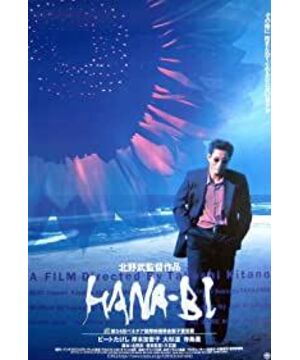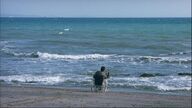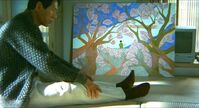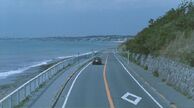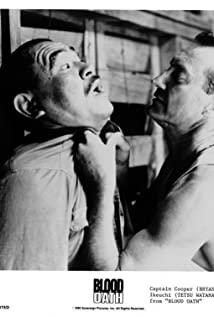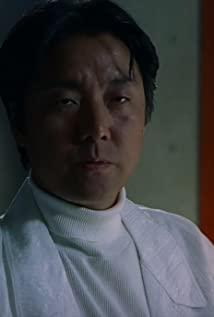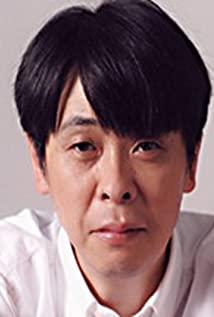In "Flower Fire", Yamada is a taciturn person. He often visits the wives of his comrades-in-arms who have died, and why he bought a new set of painting materials before leaving. In the depths of his emphasizing love and justice, it is actually guilt and self-blame.
A friend and himself were shot and killed while arresting the prisoner. Although he was also dismissed, he still blamed his recklessness;
He Du was accidentally shot and became disabled because he was waiting to see his wife in the hospital, and eventually his wife died...
Since Yamada teased the boy who played baseball on the side of the road, he has lost hope in this society. When Yamada beat the bell of the temple, he was a person who rebelled against the rules;
When Yamada handed the grilled fish to his wife by the lake, we could feel his love for his wife, who was unwilling to even hold his hands;
From the beginning to the end, the behavior of the usury group also vented the dissatisfaction that Yamada has been suppressing. This dissatisfaction has both the society and the destiny.
The owner of a car repair shop crashed into a passerby’s car and used forceful threats instead. This is a society where there is no law to speak of.
When robbing the bank, the man behind Yamada who had witnessed everything remained indifferent from beginning to end. This is an indifferent and numb society;
Scolding his wife by the lake, do not water the stranger who waters the dead flowers, this is a ruthless society that is bullying, afraid of hardship, and ruthless;
It is a hypocritical and profit-seeking society to shoot at the usury office to kill the arrogant "customers" who are unwilling to repay their debts, and later to kill their companions for one sentence;
Yamada robbed the bank and encountered passers-by who unreasonably asked for help from the "police". This is a society of low quality and high self-esteem;
Yamada's resistance and vent to provocative people and insatiable loan sharks, this is a society where only violence can have a place to stand.
Yamada wore a police uniform and drove a police car to rob the bank. He seemed to be telling us that he was no different from the real police, except that one was in the light and the other was in the dark.
The bullet that was thrown into the fire flew out like a firecracker, and it seemed to be telling us that the power weapon is like a bullet. The user can use it to kill people or use it to make good things.
For some reason, for the grandfather in front of the temple bell telling his grandson that he can’t ring the bell without time, I feel that it’s more not about education and sensibility, but that the society keeps telling generation after generation that they should follow its rules instead of To change it.
In the movie, from the most basic tones and mirrors to the experience and circumstances of the main characters, all of them reflect the darkness and indifference of the society explored by the movie.
He Du once said that the situation of the Yamada family was much worse than his own. In the end, he was shot and abandoned by his wife and children. At this time, he was far more painful than Yamada. As far as the whole movie is concerned, Yamada has a short but happy time, while He Du is a long and lonely time.
It was like the scene of Yamada leaving Hedu, and he couldn't see the edge of the sea and the lifeless beach surrounding him. Like the characters in the film, the audience is shrouded in a sense of extreme despair as if they were abandoned by the world.
The grass that suddenly appeared under He Du’s wheelchair, I don’t know whether it was the seaweed washed up by the tide or the grass brought up by the wheelchair on the land. I am more towards the former. The situation of this seaweed is just like He Du’s own world. Abandoned, just like only the poor can understand the poor, He Du threw it back into the sea, maybe he also hopes to have a big hand to help him out of this predicament.
After He Du attempted suicide, he was in the hospital and received a package from Yamada. After he was discharged from the hospital, He Du returned to the beach and took out the beret he wanted before. He wore it straight and diagonally. Finally, he felt inappropriate. He tucked it back into his arms.
This beret symbolizes He Du's past thoughts, just as he once thought that he had no second way except suicide. However, from being discovered by suicide to being rescued, perhaps he realized that what he once thought was not suitable for him. Suicide is like an inappropriate beret for myself. I can also find a hobby as my mother said, and express my emotions through painting.
Roughly speaking, the movie has two main lines, one is Yamada and the other is He Du. Yamada's story line is the constant struggle against society. The story of He Du is a man who has lost hope and his paintings.
From the speechless life between Yamada and his wife, it is not difficult for us to see that the two people have had an unhealable crack due to the sudden death of their daughter. The terminal illness of his wife and Yamada’s dismissal make it difficult to call him the two of the family. People are worse off, and all Yamada can do is to do his best to mend the estrangement that is on the verge of shattering during the short time with his wife.
The jigsaw puzzle in the hands of the wife runs through the whole thing. The tangram is like a relationship between two people. Although it is messy, although it is silent on the surface, each other's heart wants to piece these pieces together. In the beginning, the two people pieced together at the table to no avail. The jigsaw puzzle gradually became complete during the journey, and the two people's feelings gradually reconciled as before. After the completion of the tangram, the two of them also decided to leave the world together.
There was an episode during the two travels, that is, a strange man shouting at his wife not to water the dead flowers by the lake. There is no doubt that the flowers refer to his wife. This behavior also implies the coldness of society and destiny. At the same time, it seems to be telling the audience not to be confused by these scenes, there will be no miracles, and not to take this useless fluke.
He Du’s first painting was thrown on the grass by the sea, and the meaning could not be more obvious. A couple and children by the sea were playing by the sea, and He Du’s discarding meant abandoning unrealistic ideas. Later, when he passed by the flower shop, the inspiration for his paintings burst out. There are no eyes or faces in these paintings. Huaben represents beautiful things, and the things in the paintings also express a certain degree of hope. Maybe their faces and eyes are also their shell, and he hopes that under this shell is something as beautiful as a flower, not a hypocrisy that breaks his heart.
He Du's last painting is a beam of light that shines on the snow through the heavy snow, and the place where the light shines is also the place of self-determination.
In view of the fact that Yamada has little connection with Hedu in the second half of the movie, the true meaning of the painting's meaning will not necessarily refer to Yamada through Hedu's behavior.
The only intersection about this painting is the last shot that Yamada fired when he executed the enemy in the snow here. After a montage, the snow in the other painting was also covered with bright red paint. The elements and ideas of this painting remind me of the previous "Joker"
May my death be more valuable than my life
Perhaps this has also become the mind of the disabled and lonely He Du. As for the final ending of He Du, Director Takeshi Kitano did not elaborate too much. Maybe he is still painting his paintings, maybe he tried to commit suicide again... …But these are not important anymore.
From the moment he got in the wheelchair, his lonely heart, which had lost hope, had lost its vitality.
This is a depressive and icy society. Instead of living aimlessly like He Du and not knowing whether to live for himself or for others, it is better to be with his wife forever like Yamada, and there is also on that side. Their daughter.
If Yamada hadn't committed suicide, he would end up like a normal life, lonely, and nothing.
View more about Fireworks reviews


